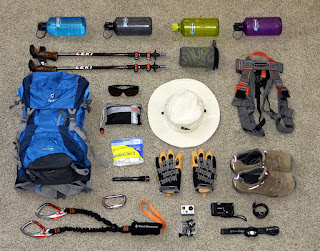Hiking Gear - The ABCs About The Perfect Hiking Gear
There are several important factors that come into play while you decide about buying the perfect hiking gear for your specific needs. You need to consider whether it'll be a short duration hiking trip or a longer, well-organized hiking trip involving sleeping and outdoor eating, already taken care of by the organizers. Your purchase of the hiking gear will greatly depend on such factors and in case the trip is not organized by an external organization, you might have plenty of work on your hand.
To start with the process of identifying all the items that you'll require for the hiking trip, it is important that you get your hiking partner (if any) involved in the planning process. No matter what distance you may be planning to go, if planned wisely and the load divided well, it can be a very
smooth experience. It is also important that you keep your baggage as minimum as possible since you'll be hiking along with it.
The primary object that deserves deliberation is the pack itself. You'll find many stores and even a few military surplus stores where you can lay your hands on some inexpensive used hiking gears in excellent condition. An ideal hiking pack will be around four thousand cubic inches, not taking into account any extra baggage such as photography equipments, hunting or fishing equipments etc. Before settling down on your final choice of hiking gear, give considerable thought to its functionality, efficiency and weight as well.
If your hiking trail would involve stopovers at night, you might be required to carry a tent along, unless you fancy sleeping in the open, under star-lit skies. You'll have to determine whether it'll be two people in one tent or two people in two tents. Tents are normally available four to five pounds in weight and are the ideal choice for cold and rainy terrains.
Sleeping bag is the other thing in your hiking gear whose purchase will need some brainstorming. The ideal choice of a sleeping bag is dependent on the climatic conditions of the place that you plan to go on hiking. Generally, sleeping bags are available in weights of two ounces to one pound, packable into a size of a softball. You may either go with a very light weight sleeping bag for warmer climates or some sophisticated variety of cold-resistant sleeping bags that are capable to keep you warm even in minus thirty degree temperatures.
Coming to the eats, it's best to carry ready to eat meals similar to the army that can be easily heated with the help of a small can of Sterno. In case you plan to go fishing, hunting or foraging during your hiking expedition, it is best to carry along hiking specific lightweight utensils for cooking.
Last but not the least, the clothing like your tent and sleeping bags will largely depend on the climatic conditions of the hiking terrain. For summers it is ideal to pack in a lot of socks (since wet socks very often result in blisters), comfortable boots, outerwear and other accessories. For cold conditions, especially the ones involving high altitude, you'll require light nylon shorts, warm gloves, long underwear, fleece jackets, hats, lightweight rainproof layer and other specific accessories for your personal needs.
Other important accessories that can be carried along as well are tools/knives, compass, headlamp, sunscreen, first-aid kit and sunscreen.
Abhishek is a Camping freak! Visit his website www.worldhikinggear.com and download his LEARN MORE ABOUT BEST HIKING GEAR AT YOUR BUDGET and learn some amazing Camping tips and tricks for FREE.

